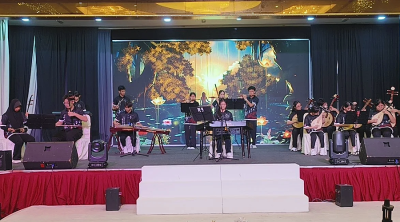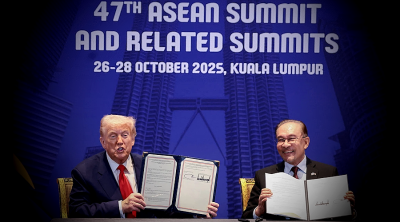
It has never happened before when the Yang di-Pertuan Agong issued a very strongly worded statement to openly rebuke a sitting government.
But as we know, it happened on July 29, 2021, when current Yang di-Pertuan Agong rebuked federal minister Datuk Takiyuddin Hassan for misleading Parliament that emergency ordinances had been revoked.
The Agong also said Takiyuddin and attorney-general Tan Sri Idrus Harun had not fulfilled their assurance that the revocation of emergency ordinances would be debated in Parliament.
The August House is carrying out a five-day special sitting from Monday July 26.
Incidentally, according to former Umno MP Tawfik Ismail, “This is not the first time Takiyuddin has shown contempt for the Constitution and ignored Parliamentary Standing Orders.”
“In 2017,” says Tawfik, “he seconded the tabling of RUU355 without the consent of the Council of Rulers and against the Standing Orders which states that before any motion pertaining to the religion is tabled, the Council of Rulers must give its consent.”
To him, PAS through Takiyuddin and its president Datuk Seri Abdul Hadi Awang then had “showed disregard and disrespect for the Constitution and the Malay Rulers”.
Tawfik is the son of former deputy prime minister the late Tun Ismail Abdul Rahman.
Back to the issue at hand. Yes, Prime Minister Tan Sri Muhyiddin Yassin was not named specifically in the Istana Negara a statement, but Takiyuddin was talking on behalf of the government on matters decided by the government led by Muhyiddin.
In short, Takiyuddin had the blessings of the prime minister when he addressed Parliament on Monday.
Hence, with the rebuke by the Agong, the right thing, or rather the only thing to do, is for the prime minister to step down.
Of course, there are people like the Menteri Besar of Pahang and Perak who want Muhyiddin to take responsibility and seek forgiveness from the Agong.
But, that is being drowned by calls, or should I say demands, for Muhyiddin to resign.
However, Muhyiddin is having none of all that. He has not apologized, at least not publicly. Nor has he shown any sign he’s stepping down.
Instead, he issued a statement through his office to counter the one issued by Istana Negara.
I will not go into the details except to point out that while the Agong had said His Majesty was not informed of the ordinances’ revocation, thus had not consented to it.
Muhyiddin claimed that the cabinet had advised the Agong and in the same breath highlighted Article 40 of the Federal Constitution that “the Yang di- Pertuan Agong shall act in accordance with the advice of the cabinet.”
What do you make of that? I’m sure we all have our own take on it. I’ll leave it to the readers to opine what Muhyiddin was saying or what the message of his statement was.
But borrowing the words of author Kim Quek writing his article in Malaysiakini, “a confrontation of sorts has occurred between the Agong and the prime minister.”
I agree, and surely many of you too. Its for all to see!
Umno man Datuk Seri Johari Ghani sees the country heading towards a constitutional crisis following the Agong’s expression of disappointment over the revocation of emergency ordinances without his consent, and the reply from the PMO.
This, says the former second finance minister, does not bode well for the people and the nation.
According to constitutional law expert professor Aziz Bari, “As anything else, crisis stage is on when the routine process of the Constitution is no longer possible. We have actually reached the second or third phase of the crisis.”
The first level, as Aziz sees it, “was when the Agong met up with the Malay Rulers and called for Parliament to reconvene as soon as possible, and the government started to delay the summoning.”
As Wikipedia puts it, in political science a constitutional crisis is a problem or conflict in the function of a government that the political constitution or other fundamental governing law is perceived to be unable to resolve.
There are several variations to this definition naturally.
And the crisis may arise from a variety of possible causes too. Among the example listed is that a government may want to pass a law contrary to its constitution. Another is that government institutions themselves may falter or fail to live up to what the law prescribes them to be.
Whatever the definition and cause, constitutional crisis its not good, as rightly pointed out by Johari earlier.
What’s the way out in our present context? Bearing in mind Muhyiddin has no intention of relinquishing his post. As it is anyway.
Aziz as well as many law experts say the Yang di-Pertuan Agong can remove a prime minister who does not have majority support.
Journalist Azril Annuar writing for The Vibes says the clearest and most obvious step (which the Agong can take) is to summon all MPs individually to Istana Negara as soon as possible to determine if Muhyiddin still has the backing of the majority of the House.
I agree with DAP’s Lim Kit Siang when he said if the prime minister is not prepared to resign, let the first item of parliamentary business on Monday be a test whether he still has majority support.
Monday August 2 is when the parliament special sitting is scheduled to reconvene. We know Thursday’s (July 29) sitting was adjourned three times with the Speaker or deputy speakers citing reasons which I do not want to repeat here.
Opposition Leader Datuk Seri Anwar Ibrahim has filed a motion for a vote of no confidence against the prime minister.
Many journalists, political analysts and observers expect Speaker Datuk Azhar Harun to block it.
I hope that will not be the case. Please give Muhyiddin a chance to prove himself.
Going by what deputy prime minister Datuk Seri Ismail Sabri Yaakob has said, that the government has the support of more than 110 MPs, then there is nothing the government has to fear in particular!
Just prove the bravado and allow Muhyiddin to be tested in Parliament.
(Mohsin Abdullah is a veteran journalist and now a freelancer who writes about this, that and everything else.)
ADVERTISEMENT
ADVERTISEMENT






































